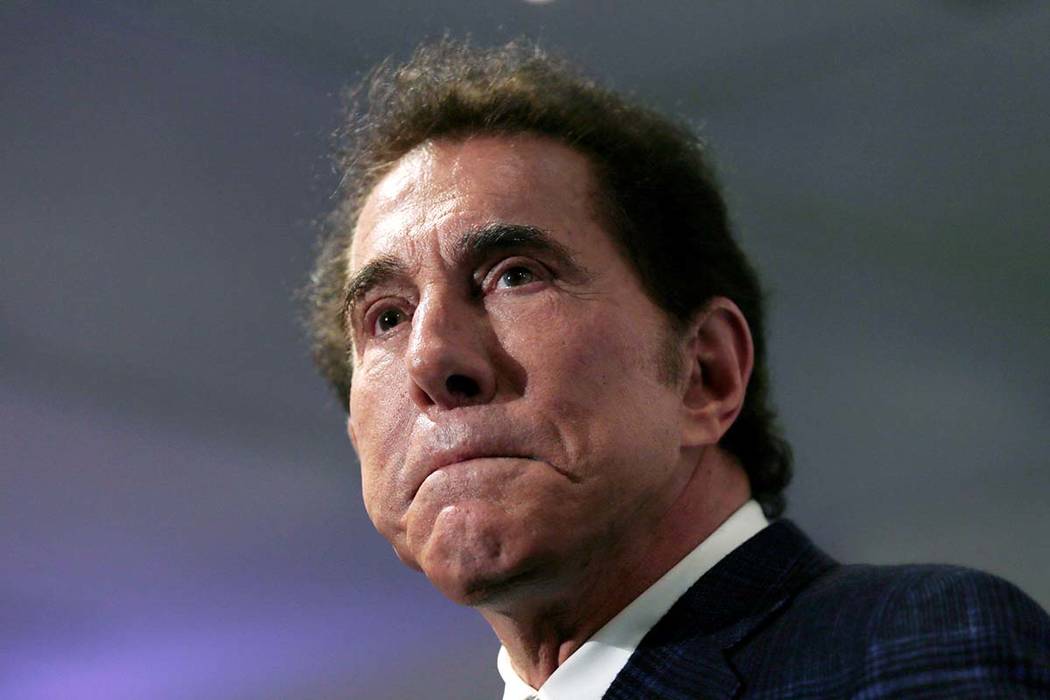New shareholder lawsuit filed against Wynn Resorts, directors

Ten months after Steve Wynn stepped down as chairman and CEO of Wynn Resorts Ltd., the company and its board of directors continue to face fresh shareholder lawsuits.
A former Wynn Resorts shareholder filed a lawsuit in Clark County District Court Nov. 27 against the company, executives and former and current board members alleging that sexual harassment accusations against the company’s former chairman and CEO devalued his stock.
Nevada resident Robert Bruce Bannister filed the lawsuit against company co-founder Wynn, CEO Matt Maddox, former Wynn executive Kim Sinatra and five former and four current members of the board of directors.
The lawsuit seeks a finding that the defendants breached their fiduciary duties, an award of damages sustained by Bannister, punitive damages against Steve Wynn in excess of $15,000 and all expenses.
The complaint alleges breach of fiduciary duty, aiding and abetting breach of fiduciary duty and civil conspiracy in the five-count action.
“Steve Wynn engaged in misconduct … and knowingly and intentionally breached his fiduciary duties by engaging in a pattern of sexual harassment and abuse and actively concealing such misconduct in violation of the company’s policies and codes as well as various laws and regulations,” the lawsuit says.
It also says the former and current directors “knowingly, intentionally and fraudulently violated and breached their fiduciary duties of good faith, fair dealing, loyalty, due care, candor and oversight as a result of the misconduct …”
Directors named in the lawsuit include current board members Jay Johnson, Pat Mulroy, Clark Randt and Alvin Shoemaker and former board members John Hagenbuch, Ray Irani, former Nevada Gov. Bob Miller, Edward Virtue and D. Boone Wayson.
Allegations in the lawsuit are based on a report in the Wall Street Journal published Jan. 26 that allege that Steve Wynn “forced sex upon a Wynn Resorts manicurist while on company property in 2005. Steve Wynn and/or the company paid a $7.5 million settlement to the alleged assault victim in 2005.”
Wynn has denied the accusations of sexual harassment and assault, but resigned as chairman and CEO in February and separated himself from the company in the weeks following his departure.
The lawsuit alleges that “defendants did nothing to protect the company and instead took actions to protect and insulate Steve Wynn from any consequences or repercussions rather than investigating his suitability under the company’s articles of incorporation.”
Shortly after Wynn stepped down, the Operating Engineers Construction Industry and Miscellaneous Pension Fund and the Norfolk County Retirement System of Massachusetts filed similar derivative lawsuits in Clark County.
Attorney Aviva Gordon of Gordon Law Las Vegas questioned the standing a former shareholder would have in a derivative action.
“If he sold his stock, then, to some extent, he got what his remedy would be,” Gordon said.
The lawsuit said Bannister “sold a certain number of Wynn Resorts stock after stock prices plummeted following publication of the Wall Street Journal article.”
Wynn stock price, at around $200 in January, closed Tuesday at $110.36 a share.
Contact Richard N. Velotta at rvelotta@reviewjournal.com or 702-477-3893. Follow @RickVelotta on Twitter.
Massachusetts meeting
The Massachusetts Gaming Commission has scheduled a closed executive session at Thursday’s meeting to discuss legal strategy in a lawsuit filed by Steve Wynn against Massachusetts Gaming Commission investigator Karen Wells.
A suitability hearing on Wynn’s Massachusetts licensing is on hold after state gaming regulators had planned to convene in early December.
A six-count lawsuit filed by Steve Wynn seeks to block the release of Wells’ investigative report based on it containing or relying on Steve Wynn’s attorney-client privileged communications from Wynn Resorts’ six-year litigation against former business partner Kazuo Okada.
The investigative report was spurred by Steve Wynn and the company’s failure to publicly disclose the settlement payment to the manicurist.
Aviva Gordon of Gordon Law Las Vegas said the closed session in Massachusetts would allow attorneys for the commission to flesh out strategy.
“I suspect the Nevada Gaming Commission also wants to protect its own privilege with counsel, which is why they would have it in an executive and closed session to have their lawyers explain the allegations that have been made and the ramifications and not to share it in a public setting,” she said.













